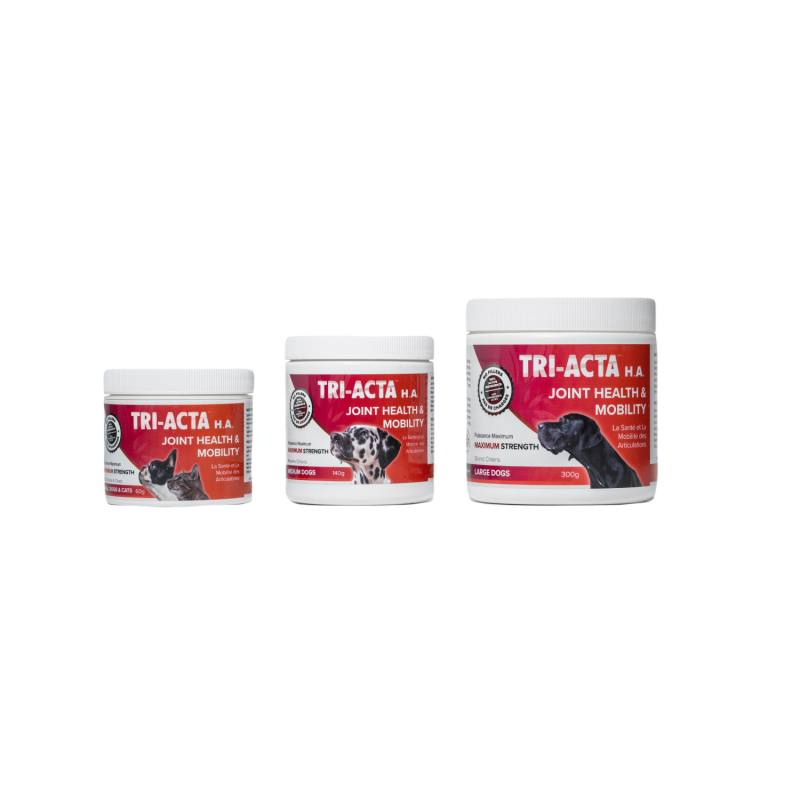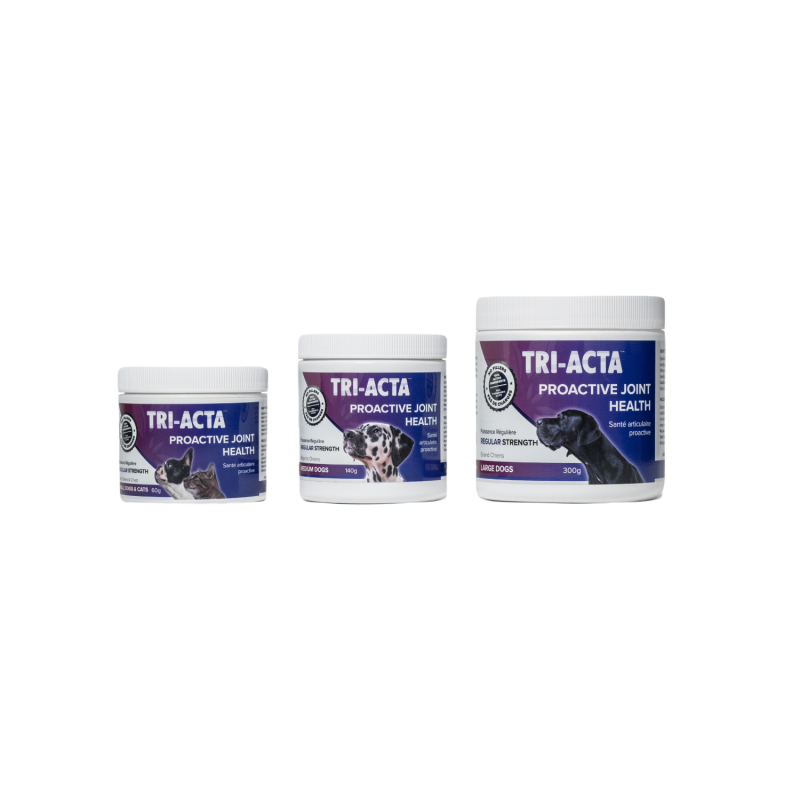Table of Contents
Dog owners are often intimately familiar with the joint-related ailments that their dog can suffer from. From arthritis to general joint degradation, 80% of dogs are estimated to develop some sort of joint condition in their lifetime.
Methods of alleviating pain and treating these joint conditions in dogs can vary. Some dog owners will turn to NSAIDs, or non-steroidal anti-inflammatory drugs (similar to ibuprofen for humans), to help relieve their dog’s pain. While these drugs are effective, they come with some nasty potential side effects, including gastrointestinal issues, reduced kidney and liver function (and even failure in some cases), and much more. The potential of these side effects occurring only increases with long-term use and a higher dosage amount. Of course, a veterinarian will help you weigh the risks and benefits of the medication, but it’s still a reality that you and your vet have to deal with.
There are other medications on the market as well, like injectable Polysulfated Glycosaminoglycan (PSGAG) or Adequan, which promises to treat the source of joint issues by rebuilding cartilage. However, many of these medications come with the potential for serious side effects that can significantly affect the quality of your dog’s life in other ways than their joint mobility.
Because of these concerns, it makes sense that dog owners would turn to alternatives that promise less or no side effects, while still providing pain relief. One of these alternatives is turmeric for dogs. As a typically human-used spice that has been around for centuries and has been known for its anti-inflammatory and other medicinal benefits, many pet owners wonder if the spice has a similar effect on dogs as it does for humans.
In this article, we explore more about turmeric for dogs, including if turmeric for arthritis in dogs is effective, if the spice can even be given to dogs in the first place, and much more.
Why Is Tumeric Good for Dogs?
Turmeric, a golden-yellow spice commonly used in cooking, has been recognized for its medicinal properties for centuries. Derived from the root of the Curcuma longa plant, turmeric contains a powerful compound called curcumin, which is known for its anti-inflammatory, antioxidant, and antimicrobial benefits. Recently, turmeric has gained popularity in the pet health world, especially for dogs, as a natural supplement to support overall health and address specific health issues. The reason for dog owners turning to this spice as a potential solution for their dog’s ailments is that it’s a natural ingredient that has little to no side effects.
Dosage and Safety
When considering turmeric for dogs, the appropriate dosage depends on the size and specific health needs of the dog. General guidelines suggest starting with a small dose to ensure the dog tolerates it well. A typical dosage recommendation is 1/8 to 1/4 teaspoon of turmeric paste (golden paste) per day for small dogs, and up to 1/2 teaspoon per day for larger dogs. This paste is made by combining turmeric powder with water, black pepper (to enhance curcumin absorption), and a healthy fat such as coconut oil. It is important to consult a veterinarian to determine the exact dosage suitable for your dog’s needs and health condition.
Potential Side Effects
Turmeric is generally considered safe for dogs when administered in appropriate amounts. However, some dogs may experience gastrointestinal issues such as diarrhea or constipation, particularly if they are given too high a dose too quickly. To mitigate these side effects, it is recommended to start with a lower dose and gradually increase it. Additionally, turmeric can interact with certain medications, especially blood thinners and anti-inflammatory drugs, so it is crucial to consult a veterinarian before starting turmeric supplementation.
Tumeric Benefits for Dogs: What Does Tumeric Do for Dogs?
Due to the active compound in turmeric (curcumin) the benefits of turmeric for dogs can be numerous when it is used appropriately. Here are the main benefits of the spice:
1. Anti-Inflammatory Effects
Turmeric is widely recognized for its anti-inflammatory properties, making it an attractive choice for dogs suffering from arthritis, joint pain, and other inflammatory conditions. Curcumin, the active compound in turmeric, inhibits enzymes and cytokines involved in inflammation, thereby reducing pain and swelling.
However, it’s important to realize that the therapeutic benefits of turmeric can’t be guaranteed. This is mainly because the quality and efficacy of the therapeutic effects of a pure plant can’t be controlled. We’ll get into more details on this later in the article. But if you want to ensure that your dog will receive anti-inflammatory benefits, the best solution is to opt for a dog joint supplement like TRI-ACTA.
2. Antioxidant Properties
Curcumin is a potent antioxidant that neutralizes free radicals, protecting cells from damage. This action supports overall health, enhances the immune system, and reduces the risk of chronic diseases. PetMD highlights that the antioxidant properties of turmeric help in combating oxidative stress, which is crucial for maintaining a healthy immune response and preventing disease
3. Pain Relief
Due to its anti-inflammatory and analgesic properties, turmeric provides some natural pain relief for dogs. This is particularly beneficial for managing discomfort associated with joint pain, muscle soreness, and post-surgery recovery.
However, similar to relying on turmeric as an anti-inflammatory, the pain relief that your dog will get from turmeric can be hit and miss due to variances in the composition of the spice. The best way to ensure consistent, effective pain relief is to give your dog NSAIDs, but joint supplements with Methylsulfonylmethane (MSM) like TRI-ACTA can also provide pain relief by reducing inflammation of the joints.
4. Digestive Health
Turmeric aids in digestion by stimulating bile production in the liver, which helps alleviate digestive issues such as bloating, gas, and indigestion. This can be especially beneficial for dogs with sensitive stomachs or those prone to gastrointestinal disturbances.
5. Antimicrobial Benefits
The antimicrobial properties of turmeric make it effective in fighting infections and supporting overall immune health. It can help manage and prevent skin infections, assist with wound healing, and aid in fighting bacterial or fungal issues. However, if your dog already has one of these ailments, turmeric alone likely won’t cure the problem, just provide some assistance alongside actual medication. It’s important to seek veterinary treatment if your dog is suffering from a potential infection or skin condition.
6. Heart Health
Turmeric can improve cardiovascular health by reducing cholesterol levels, preventing blood clots, and improving overall circulation. This is particularly useful for dogs with heart conditions or those at risk of developing cardiovascular issues.
7. Liver Health
Turmeric supports liver health by enhancing the liver's ability to detoxify the body. It stimulates the production of bile, which aids in the digestion and absorption of fats and fat-soluble vitamins, thereby promoting liver function and overall digestive health.
8. Cancer Prevention
Curcumin has been studied for its potential anti-cancer properties. It may help prevent the growth and spread of certain types of cancer cells by inhibiting their ability to proliferate. While research is ongoing, the inclusion of turmeric in a dog's diet could potentially contribute to a lower risk of cancer development.
Dog Tumeric Forms

Turmeric can be administered to dogs in various forms, each offering unique benefits and methods of incorporation into your pet's diet. Here are the common forms of turmeric for dogs:
|
Form |
Description |
Usage |
Benefits |
|
Turmeric Paste for Dogs (Golden Paste) |
A mixture of turmeric powder, water, black pepper, and a healthy fat like coconut oil. |
Mix into dog’s food. Start with 1/8 to 1/4 teaspoon and gradually increase to ensure tolerance. |
Easy to mix with food, can be made at home. |
|
Turmeric Powder for Dogs |
Versatile form that can be sprinkled directly onto food. |
Sprinkle over food or mix into treats. Start with a small dose and gradually increase. |
Easy to store, mix with food, widely available, and cost-effective. |
|
Turmeric Chews for Dogs |
Pre-made treats containing turmeric, often with other beneficial ingredients like glucosamine or chondroitin. |
Administer as directed on packaging. Typically given as a treat. Be cautious of fillers and additives. |
Convenient, highly palatable, easy to store. |
|
Turmeric Pills for Dogs |
Pills or capsules standardized to contain specific amounts of curcumin. |
Administer directly or hidden in food. Follow dosage based on size and health condition. |
Precise dosage, often combined with other health benefits. Can be difficult to administer. |
|
Turmeric Tablets for Dogs |
Similar to pills, designed for easy administration and may include additional health ingredients. |
Give directly or crush and mix with food. Follow manufacturer or veterinarian dosage instructions. |
Consistent and easy dosing, easy to include in supplement regimen, often flavored for palatability. |
Turmeric Paste for Dogs (Golden Paste)
Turmeric paste, also known as golden paste, is a mixture of turmeric powder, water, black pepper, and a healthy fat such as coconut oil. The black pepper enhances the absorption of curcumin, the active compound in turmeric, while the fat helps improve its bioavailability.
- Usage: Golden paste can be easily mixed into your dog's food. It is recommended to start with a small amount (typically 1/8 to 1/4 of a teaspoon) and gradually increase the dosage to ensure your dog tolerates it well.
- Benefits: Easy to mix with food, and can be easily made at home.
Turmeric Powder for Dogs
Turmeric powder is a versatile form that can be sprinkled directly onto your dog's food. It is important to use high-quality, organic turmeric powder to ensure it is free from additives and contaminants.
- Usage: Sprinkle the powder over your dog's food or mix it into homemade treats. Same as the paste, start with a small dose and gradually increase it based on your dog's tolerance and health needs.
- Benefits: Easy to store, easy to mix with food, widely available and cost effective (many pet stores and websites sell turmeric powder for dogs).
Turmeric Chews for Dogs
Turmeric chews are pre-made treats that contain turmeric as a primary ingredient. These chews are convenient and often include other beneficial ingredients like glucosamine or chondroitin for joint health.
- Usage: Administer the chews as directed on the packaging. They are typically given as a treat, making them easy to include in your dog's daily routine. However, it’s important to note that treats often contain fillers, additives, and preservatives, which add calories to your dog’s diet and may cause adverse effects like allergic reactions or intolerances.
- Benefits: Convenient and easy to give your dog, highly palatable, and easy to store.
Turmeric Pills for Dogs
Turmeric pills or capsules are another convenient option for supplementing your dog's diet with turmeric. These are often standardized to contain a specific amount of curcumin.
- Usage: Administer the pills as directed, either directly or hidden in food or treats. It is essential to follow dosage recommendations based on your dog's size and health condition.
- Benefits: Precise dosage, and often combined with other ingredients to provide additional health benefits. However, a pill can sometimes be difficult to administer to your dog.
Turmeric Tablets for Dogs
Similar to pills, turmeric tablets are designed for easy administration and may come with additional ingredients to support overall health.
- Usage: Tablets can be given directly or crushed and mixed with food. Follow the dosage instructions provided by the manufacturer or your veterinarian.
- Benefits: Consistent and easy dosing, easy to include in your dog’s supplement regimen, often flavoured to make the tablets more palatable to your dog.
How Much Tumeric for Dogs?
Tumeric Dosage for Dogs
Determining the appropriate turmeric dosage for your dog involves considering the dog’s size, health condition, and specific needs. While there is no one-size-fits-all dosage, general guidelines can help you start supplementing turmeric in your dog's diet.
|
Dog Size |
Initial Dosage |
Gradually Increase to |
|
Small Dogs (10-20 lbs) |
1/8 teaspoon of turmeric paste per day |
1/4 teaspoon per day |
|
Medium Dogs (21-50 lbs) |
1/4 teaspoon of turmeric paste per day |
1/2 teaspoon per day |
|
Large Dogs (51-100 lbs) |
1/2 teaspoon of turmeric paste per day |
1 teaspoon per day |
|
Extra-Large Dogs (Over 100 lbs) |
3/4 teaspoon of turmeric paste per day |
1 1/2 teaspoons per day |
Important Considerations
- Consult Your Veterinarian: Before starting any new supplement, it’s crucial to consult with your veterinarian to determine the appropriate dosage for your dog's specific health needs.
- Monitor for Side Effects: Watch for any signs of gastrointestinal upset, such as diarrhea or constipation, especially when first introducing turmeric to your dog’s diet.
- Adjust Dosage as Needed: If your dog shows any adverse reactions, reduce the dosage or discontinue use and consult your veterinarian.
Turmeric for Dogs vs. Joint Supplements (and Why Joint Supplements are the Better Choice)
When it comes to promoting joint health in dogs, joint supplements may offer more comprehensive benefits compared to turmeric alone. Here’s why joint supplements could be a better choice for your dog’s joint health:
1. Comprehensive Joint Health Support
Joint supplements often contain a combination of glucosamine, chondroitin sulfate, MSM (methylsulfonylmethane), and sometimes hyaluronic acid. Each of these ingredients plays a unique role in supporting joint health:
- Glucosamine helps repair and maintain cartilage. TRI-ACTA contains two types of glucosamine, HCl and sulfate. HCl is a highly bioavailable form of glucosamine, allowing your dog’s body to absorb it and gain the benefits of it quickly. Sulfate is an essential component for joint health, helping to faciliate cartilage regeneration and repair.
- Chondroitin Sulfate: Inhibits cartilage-destroying enzymes and promotes water retention and elasticity in cartilage. In tandem with glucosamine, chondroitin sulfate promotes cartilage repair.
- MSM: Provides sulfur, which is a vital building block for joints and cartilage, and has anti-inflammatory properties.
- Hyaluronic Acid: Thickens the synovial fluid in the joints, which helps provide better lubrication of the bones and surrounding structures, which eases movement and reduces pain.
TRI-ACTA H.A. for Pets
Our maximum strength formula is optimally designed to accelerate the formation of cartilage, minimize inflammation, expedite the healing process, and improve joint conditions.

2. Specific Formulations for Joint Issues
Joint supplements are specifically formulated to address joint health issues. They are designed with the optimal ratios of ingredients to ensure maximum efficacy. Turmeric, while beneficial, does not provide this targeted approach.
3. Multi-Faceted Anti-Inflammatory Effects
While turmeric is known for its anti-inflammatory properties, joint supplements provide a multi-faceted approach to inflammation and pain relief. The combination of glucosamine, chondroitin, MSM, and hyaluronic acid (available in TRI-ACTA H.A.) offers comprehensive support. The hyaluronic acid available in extra-strength TRI-ACTA H.A. provides additional joint lubrication by thickening the synovial fluid in your dog’s joints, allowing for easier movement and reducing or eliminating pain.
It’s important to note that joint supplements like TRI-ACTA and TRI-ACTA H.A. treat the underlying cause of joint issues in your dog rather than simply providing pain relief. The combination of naturally occurring ingredients in TRI-ACTA products ensures that your dog’s body has enough of these ingredients to support their joint health and assist with healing, while turmeric provides some anti-inflammatory properties, but no direct joint healing effects. You can safely use TRI-ACTA products in conjunction with turmeric in your dog’s diet without having to worry about adverse effects.
4. Ease of Administration
Joint supplements are available in various forms, including chews, tablets, and powders, making them easier to administer consistently. This ensures that dogs receive the correct dosage daily, which is critical for the supplements to be effective.
Powdered joint supplements for dogs are often the best to give your pup. They store easily, are easy to administer (simply sprinkle on top of your dog’s regular food) and come in flavourless and flavoured options. TRI-ACTA is completely flavourless, and the included scoop makes it easy to ensure you’re giving your dog the right dose each time. Because dosages of TRI-ACTA are small, the likelihood that your dog will even notice it is slim to none.
5. Guaranteed Therapeutic Value
Tumeric comes from a plant. If you have two plants side by side, grown in the exact same way and under the exact same conditions, you still can’t guarantee that their internal components will be exactly the same. This might be fine for things like flavour, but therapeutic value can be significantly affected. Joint supplements like TRI-ACTA are created under strict conditions, following good manufacturing practices, ensuring that every container provides the same therapeutic benefits.
6. Clinical Evidence and Veterinary Approval
Many joint supplements for dogs, including those containing glucosamine, chondroitin, MSM, and hyaluronic acid, are backed by clinical research and are often recommended by veterinarians. For example, TRI-ACTA is an approved veterinary health product, which means it follows Health Canada’s rigorous guidelines for efficacy. Joint supplements have also been extensively studied for their efficacy and safety in improving joint health and mobility in dogs. On the other hand, while turmeric has promising benefits, there is less clinical evidence specifically supporting its use in dogs, making joint supplements a more reliable choice.
7. Long-Term Use and Safety
Joint supplements are generally safe for long-term use, with minimal side effects. Ingredients like glucosamine and chondroitin are naturally occurring substances in the body, reducing the risk of adverse reactions. Turmeric, although beneficial, can sometimes cause gastrointestinal upset in dogs, especially if not introduced gradually. The comprehensive and balanced formulation of joint supplements ensures that they can be safely used over extended periods to maintain joint health.
Conclusion
Understanding the benefits and applications of turmeric for dogs is essential for pet owners looking to provide natural and effective health support for their canine companions. Turmeric, with its anti-inflammatory, antioxidant, and antimicrobial properties, offers several health benefits, particularly for dogs suffering from joint pain, digestive issues, and immune health concerns.
Joint supplements are specifically formulated to address the complex needs of joint health, providing a multi-faceted approach to reducing inflammation, promoting cartilage repair, and ensuring proper lubrication of joints. They are also easier to administer consistently, ensuring that dogs receive the correct dosage daily for maximum benefit.
While turmeric can be a valuable supplement, it's important to recognize that its efficacy may vary due to differences in the quality and composition of the turmeric used. For consistent and targeted joint health support, joint supplements like TRI-ACTA, which combine multiple proven ingredients such as glucosamine, chondroitin sulfate, MSM, and hyaluronic acid, are often more reliable and comprehensive.
Purchase TRI-ACTA online or learn where to buy at a store near you.
TRI-ACTA for Pets
A proactive approach for developing and younger adult pets to maintain optimal joint health mobility, minimize inflammation and fend off age-related ailments.

Newsletter Signup
Subscribe to our newsletter to receive the latest news and exclusive offers.
.jpg?height=2000&name=Cliick_Integricare-DISPLAY-REVISEDV2%20(1).jpg)
Proactive & Therapeutic Joint Supplements
When given daily, Integricare joint supplements recover bone and joint injuries faster and help prevent mobility injuries from happening in the first place.














